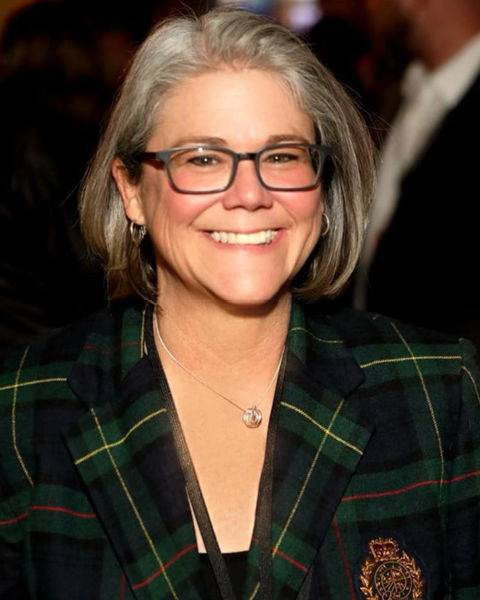Biography
Dr. E. Michele Ramsey is a professor of Communication Arts & Sciences and Women's, Gender, and Sexuality Studies and also founded the major in Communication Arts & Sciences at the college. Dr. Ramsey teaches: public speaking; careers in communication; gender and communication; identity, citizenship, and the Rhetoric of American Horror Films; conflict management; and Taylor Swift, Gender, and Communication. Her research interests include representations of gender in the media, women's rights rhetoric, social movement and political rhetoric, and advocation for the humanities.
She's won a number of awards for her research, teaching, and service including the following:
- 2001 Cheris Kramarae Dissertation Award from the Organization for the Study of Communication, Language, and Gender;
- 2006 Penn State Berks Outstanding Faculty Advising Award;
- 2008 Penn State Berks Outstanding Faculty Service Award;
- 2009 Curricular Integration Award from the President's Commission on LGBTQ Equity at Penn State University;
- the 2010 Achieving Woman Award (faculty category) from the President's Commission on Women at Penn State University, and the 2015 Rosemary Schraer Mentoring Award from the President's Commission on Women at Penn State University;
- the 2016 Community Partnership Award from the Junior League of Reading;
- the 2017 Feminist Teacher/Mentor Award from the Organization for the Study of Communication, Language, and Gender;
- the Penn State Berks HASS Division 2023 ARID (Anti-Racism, Intersectionality, De-colonialism) Teaching & Service Award;
- the 2023 Community Engagement in the Greater Berks Area Award; and
- the 2023 Outstanding Faculty Community Engagement Award.
Her research and expertise have been cited in hundreds of regional, national, and international popular press media.
Research Interests
Dr. Ramsey's research interests include:
- Women and politics/political communication
- Social movement rhetoric
- Political communication
- Popular culture, communication, and identities
- Emotional labor
- Gender and communication
- Rhetoric of horror film
- Taylor Swift (gender/media representation/social media)
- Advocation for the humanities
- Conflict management
- Rhetorical studies
Publications
Ramsey, E.M. (2022). Advising and the Consumption Metaphor in Higher Education. Academic Advising Praxis and Perspectives, 3.1, pp. 59-70.
Ramsey, E.M. (2022). Narrative Possibilities for students who shifted to online learning during COVID-19 and what those possibilities can mean for online education in the future. In COVID and Higher Education Implications for Teaching and Learning During COVID-19. Strawser, M., Ed. New York: Lexington, pp. 11-22
Grobman, L. and Ramsey, E.M. 2020. Major Decisions: College, Career and the Case for the Humanities. University of Pennsylvania Press.
Ramsey, E.M. (2017). Gender as a consideration when designing health and risk messages. In Encyclopedia of Health and Risk Management Design and Processing. Parrot, R. (Ed.). New York: Oxford University Press, pp. 37-56.
Ramsey, E.M. (2017). Capstone-ish: Student success and the rhetorical functions of a different kind of capstone course. Journal for the Association of Communication Administration, pp. 53-64.
Ramsey, E.M. (2017). The Basic Course in Communication, Media Literacy, and the College Curriculum. Journal of Media Literacy Education, 9.1, pp. 116-128.
Fredericks, S., Ramsey, E.M., and Hornett, S. (2011). Kinship and Bystander Effect: The Role of Others in Ethical Decisions. Journal of Religion and Business Ethics, 2, 2011.
Ramsey, E.M. (2006). Driven from the public sphere: The conflation of women’s liberation and driving in advertising from 1910-1920. Women’s Studies in Communication, 29.1, pp. 88-112.
Ramsey, E.M. (2005). Protecting patriarchy: The myths of capitalism and patriotism in The People vs. Larry Flynt. Feminist Media Studies, 5.2, pp. 197-213.
Ramsey, E.M. (2005). Selling social status: Automobile advertisements in the Ladies’ Home Journal from 1910 to 1920. Women and Language, Spring 2005, pp. 26-38.
Ramsey, E.M. (2004). Addressing issues of context in historical women’s public address. Women’s Studies in Communication, 27.3, pp. 252-276.
Ramsey, E.M., Achter, P., Condit, C.M. (2001). Genetics, race, and crime: An audience study exploring the effects of The Bell Curve and book reviews. Critical Studies in Media Communication, 18.1, pp. 1-22.
Ramsey, E.M. (2000). Inventing citizens during World War I: Suffrage cartoons in The Woman Citizen. Western Journal of Communication, 64.2, pp. 113-147.
Ramsey, E.M. and G. Santiago. (Spring, 2004). The conflation of homosexuality and femininity in Queer Eye for the Straight Guy. Feminist Media Studies, 4.3, pp.353-355.
Ramsey, E.M., Achter, P., Condit, C.M. (2001). Reading audiences: A reflection on the politics of the production of racism. Critical Studies in Media Communication Vol. 18.4, pp. 471-474.
Ramsey, E.M. (2004). Media Criticism Group Speech. Communication Teacher 18.1, pp. 20-22.
Ramsey, E. M. (2003). Communication ethics: The Challenger explosion. Teaching Ideas for the Basic Communication Course 7 (Fall), pp. 87-97.
Ramsey, E.M. Forthcoming in 2019. Critical Engagement or critical mistake?:Social media, ethics, and critical communication pedagogy. Mediated Critical Communication Pedagogy. D. Fassett and A. Atay, Eds. New York: Lexington.
Ramsey, E.M. (2010). Using Language Well. Public Speaking: The Virtual Text. Ed. Lisa Schrieber.
Ramsey, E.M. Submitted in 2018. A Place of Darkness: The Rhetoric of Horror in Early American Cinema. Rhetoric and Public Affairs.
Ramsey, E.M. (2011). Rhetoric, Representation, and Display: Gender and Political Communication in America. Rhetoric and Public Affairs 14.1, pp. 169-172.
Ramsey, E. M. (2003). Who is this ideal woman and why does she keep following me? Review of Communication 3.2, pp. 180-184.
Ramsey, E.M. (2001). Gender in contemporary fantasy and science fiction television. The Review of Communication, 2.1, pp. 109-114.
Ramsey, E.M. (1999). Review of Rhetoric Retold. Women’s Studies in Communication, 22.2, pp. 241-245.
Education
- 2000, Ph.D., Communication Studies, University of Georgia
- 1995, M.S., Communication Studies, University of North Texas
- 1992, B.A.A.S., Political Science, University of North Texas
